He defeated the Destourians
With a malicious smile
He betrayed the Tunisians."
Following the violence during the repression of April 9, the following extract (from a leaflet in French distributed by the Destourians) shows the disillusionment in the face of impossible negotiations with the colonising power. This day thus marked a turning point in the Tunisian nationalist struggle. Identified in official contemporary history as the "Day of the Martyrs" - April 9, 1938, took place within a tense national and international context.
The Shadow of Fascism
The beginning of 1938 was marked on a European level by the strengthening of the regimes of Hitler and Mussolini. Germany's invasion of Austria on March 11 the same year caused concern for the French state, especially as it shared borders with Italian Libya through Tunisia. Thus, when the demands of the Tunisian nationalist party 'Neo-Destour' became more urgent, the French government claimed that there was a conspiracy with the Italian fascist regime.
This collusion was denounced by the Popular Front who were in power in France* at the time, and who were made up of a coalition of left-wing parties, including the French Communist Party. For the coalition, it was imperative to preserve the unity of the French empire in order to avoid the very worst. However, it is not clear whether it was concern for France or for the colonised peoples that prevailed. The secretary general of the PCF, Maurice Thorez, wrote that in order to "fight against fascism [...], the interest of the colonial people lies in their surrender to the French, and not in an attitude that could favour the enterprises of fascism and place [...] Algeria, Tunisia and Morocco under the rule of Mussolini and Hitler "**.
In any case, it was this argument that the colonial newspapers put forward to criticise the Tunisian nationalist protest. It was said to be an attempt "to exploit the most unfortunate circumstances resulting from the global situation, as well as from the actions of the government whose goodwill [...], generosity and human nature [...] can no longer be disputed" ( La Dépêche tunisienne, April 9). However, French policy in Tunisia contradicted the newspaper's statement.
A Hostile Colonial Policy
The rise to power of the political left in France in 1936 was initially promising. After the persecution of the former Resident General Peyrouton, nationalist activity developed intensely under the new Resident General Guillon who had been appointed by the Popular Front government. The prison camp in the middle of the desert, Bordj le Bœuf, was closed down and the political prisoners who held there (such as Habib Bourguiba) were released. But the fall of Léon Blum's government in June 1937 marked a failure in the negotiations for Tunisian independence, and French policy in Tunisia was tightened once more.
A series of factors followed that fuelled resistance and political awareness, such as increased unemployment, impoverishment, risk of famine, dissolution of trade unions, surveillance of sports associations and students, strikes that were repressed in several mining centres, prohibition of the bearing the Tunisian flag, refusal of requests for a Tunisian parliament under the pretext that Tunisians would not be sufficiently evolved to have the right to universal suffrage*...
The Bizerte incidents on January 8, 1938 (when police officers killed seven activists protesting against the secretary of the Destour cell in Bizerte being expelled to Algeria) gave rise to partisan tours calling for revolt and civil disobedience. The Neo-Destour was quickly accused of plotting against State security and of taking advantage of the political fragility of the French State to conduct a "campaign of hatred against France".
The party, led by its "hard-line" section (represented by Habib Bourguiba) after the defeat of the "soft-line" section (represented by Mahmoud el Materi) following its 1937 congress, was targeted by the authorities: some twenty activists or heads of Destourian cells were arrested throughout the country, including Slimane ben Slimane, Youssef Rouissi, Salah ben Yousef, Hedi Nouira and Mahmoud Bourguiba.
The population was already on edge, and events rapidly followed one another until the climax of April 9.
April 7, the Eve of a General Protest
A demonstration takes place in front of the beylical palace of Hammam-Lif and a delegation is received by Ahmed II Bey, Tahar Sfar being one of them. The delegation protested against the prohibition of bearing the Tunisian flag, the closure of the Sadiki college and the prosecution of nationalist activists. The bey asked them to keep calml and promised to speak to the resident general. He gave his authorisation to bear the flag during the authorised demonstration due to take place the following day. Despite the legal status of this demonstration, the French authorities were concerned.
"The popular sector is getting [...] very overexcited: the unemployed, the metouis and the 'zoufris' make no secret of their firm desire to provoke unrest [...] declaring that they are determined to sacrifice their lives for the cause of their country" (Report on April 7, 1938).
Dissensions were evident among the Tunisian political forces. The Old Destour party asked their supporters to not take part in the demonstration. The Tunisian Communist Party aligned itself with the concerns of the French government, and like the ruling Popular Front (of which the PCF was a part) it accused the Neo-Destour party's policy of "supporting fascism, which threatens Tunisia with military occupation". They found that the Neo-Destour desire "to incite civil unrest, not to submit to military service, to call for a tax strike [...] is tantamount to supporting fascist activities in Tunisia and [...] is reminiscent of collusion with Italian fascists. ("Resolution of the political bureau of the Tunisian Communist Party" published in the Avenir social, April 7).
April 8, Elation Before the Upheaval
The day of Apri 8l was characterised by activist elation throughout several cities, such as Moknine, Teboulba, Jemmal, Monastir, Djerba, Kalaa Kebira, Béja, Mahdia, Nabeul, Sfax, Sousse, Souk el Arba [now Jendouba], Bizerte, El Hamma, Testour... Various reports claim that thousands of demonstrators took part in this unprecedented event launched by the Neo-Destour party. In Tunis, groups of demonstrators set off from Bab Souika and Bab Jdid, before meeting at Bab Bhar to march to the headquarters of the General Residence [now the French Embassy]. According to police and newspaper reports, between 7,000 and 10,000 people took part in the demonstration.
The Neo-Destour demand for the closure of cafés and shops in the souks was largely respected. However, police reports note that some shopkeepers closed reluctantly. One report indicates that 300 "natives" armed with truncheons went through the El Grana souk to "force the Israelite traders who had kept their shops open to close through threats and vandalism". The aim, according to the report, was "to rally the Jewish population to join their processions which were due to demonstrate in front of the Residence, telling them that as 'Tunisians like us, you must join us'".
While presenting the Jewish population as a depoliticised community; inoffensive and only interested in running businesses, the police drew a contemptuous portrait of the demonstrators as "vulgar characters: porters, day labourers, shoeshine boys, children and students of the great mosque" who would have shouted "long live 'The Duce'! long live Mussolini, enough of this injustice, we don't want France in Tunisia any more!"
Avenue Jules Ferry [now Avenue Habib Bourguiba] was filled with armour and barbed wire*.
The authorised demonstration was held under the suspicious eye of the police who were watching and protecting the so-called "European" city. The procession was made up of men and women (300 women according to an article in the Arabic-language newspaper Az-zahra published the next day) bearing Tunisian flags. The ululations intertwined with the call for a "Tunisian parliament"; one group calling out "Tunisian" and the other answering with "parliament" (Arabic-language newspaper An-nahda, 9 April). On banners in Arabic and French, one could read "down with privilege", "national government", "Tunisians in power". The police were surprised by the participation of women, as they associated their presence with that of children:
"Even the women, in between their ululations, called for a parliament. The children as well."
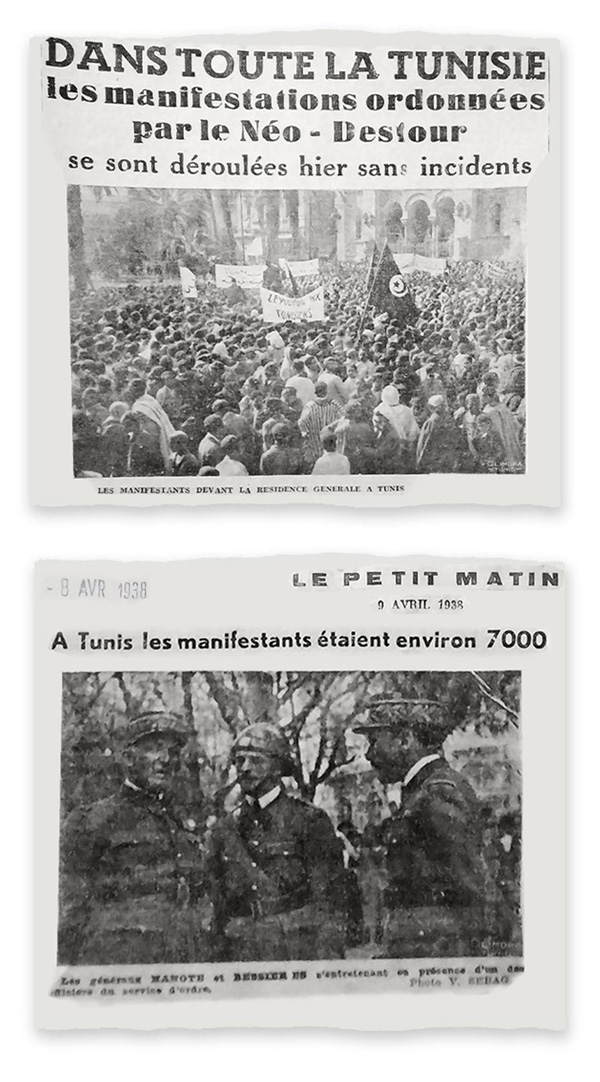
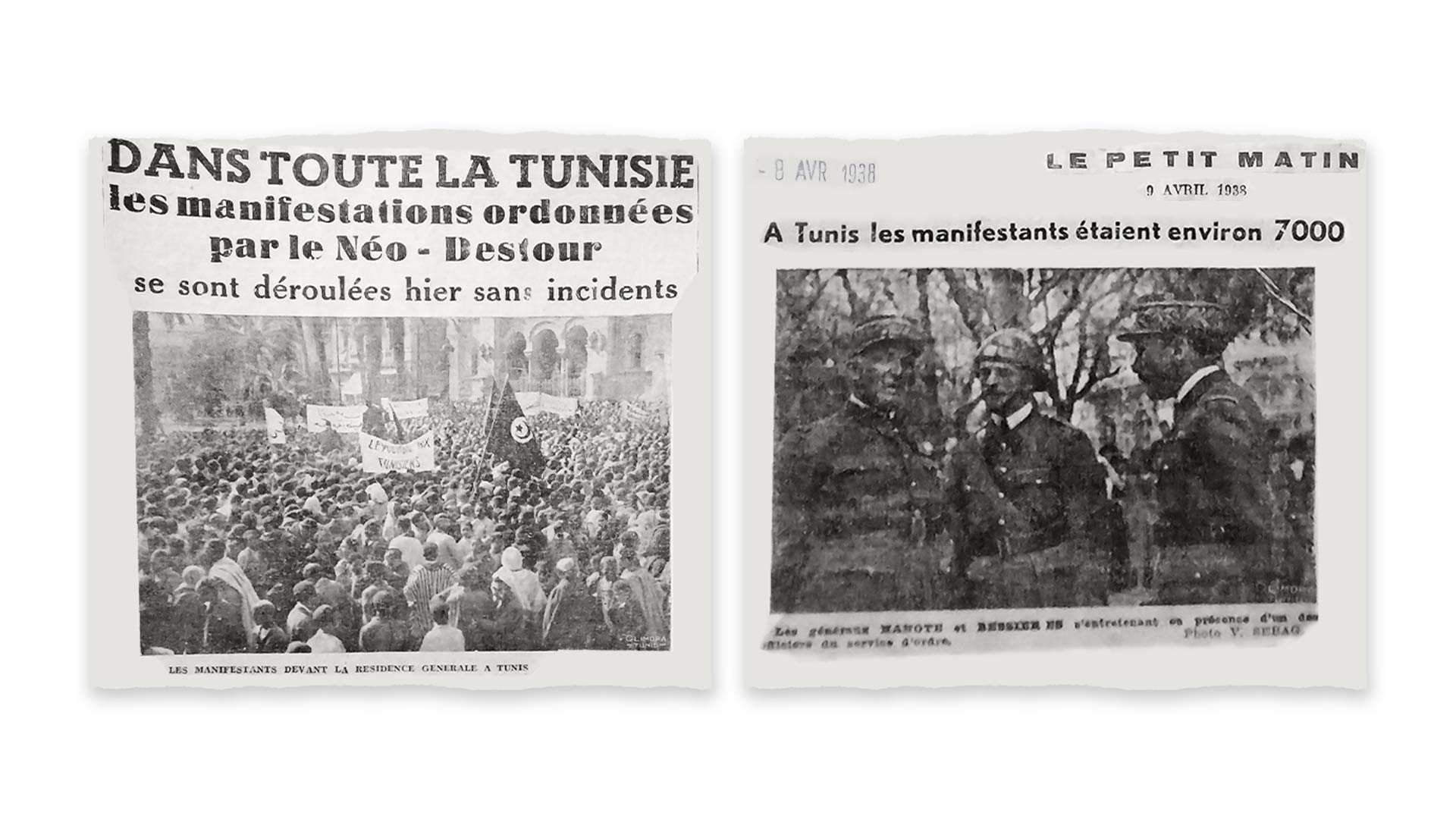
Tunisian National Archives
Mongi Slim, Ali Darghouth, Ali Belhouane and other party members addressed the crowd. Bchira Ben Mrad, president of the Muslim Union of Tunisian Women*, reportedly stood next to Ali Belhouane during his speech**.
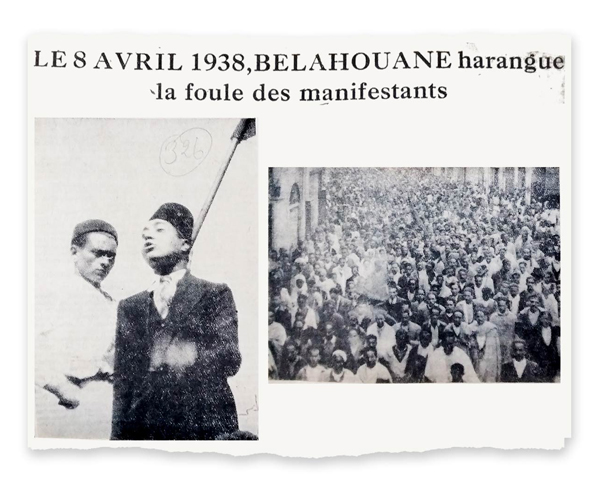
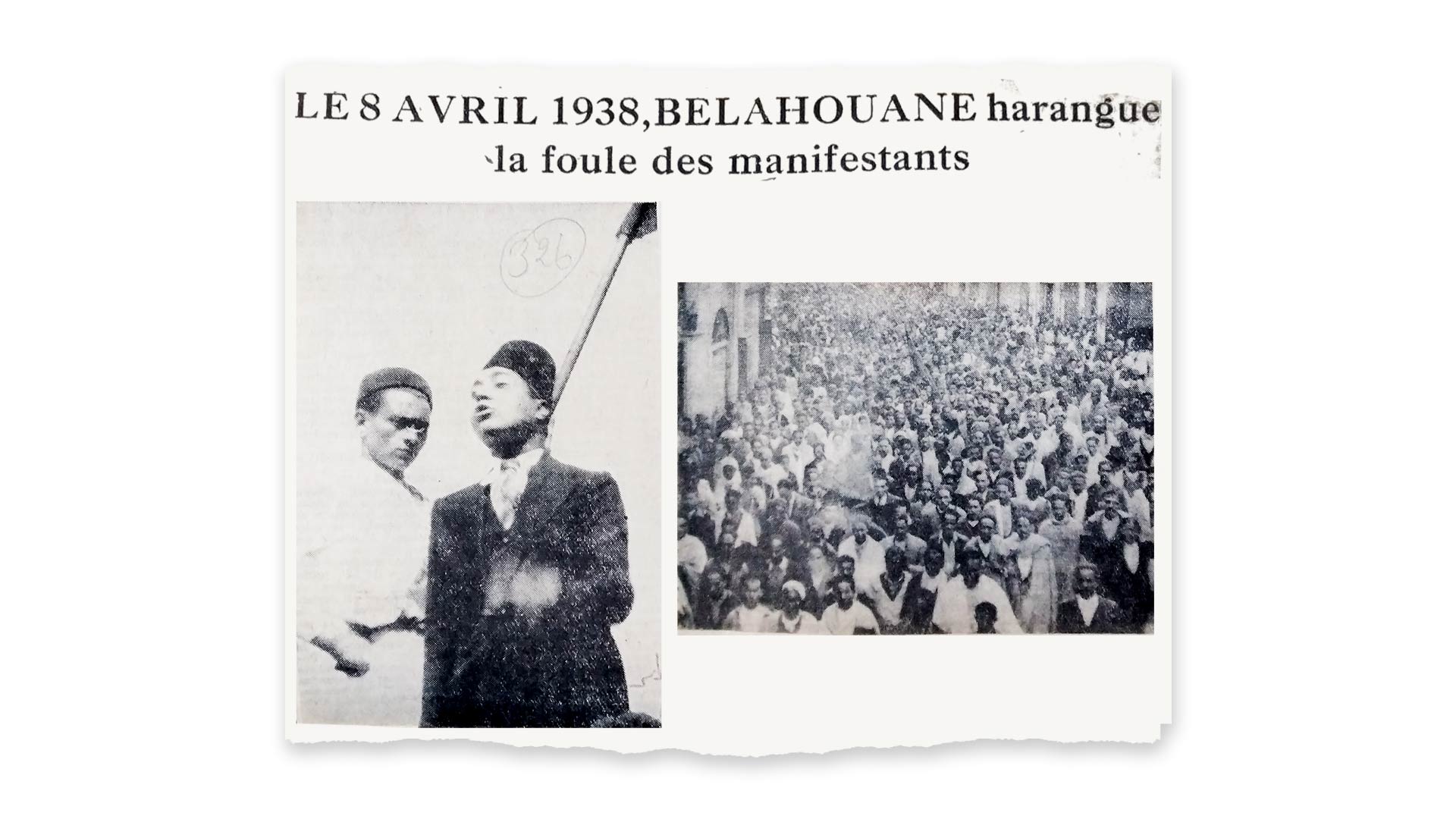
Tunisian National Archives
After the demonstration was dispersed and the groups of demonstrators returned to the so-called "Arab" area, Ali Belhouane was reported to have declared at Place aux Moutons that if the Neo-Destour detainees (arrested in March for "riotous language, disobedience, incitement to acts of sabotage and refusal of military service") were not released, the General Residence and the prison would have to be attacked. The words of this nationalist activist, already under close surveillance because of his anti-colonial teaching at Sadiki College, were recorded by a police informer, which resulted in him being summoned to appear before a judge the following day*.
By the end of the day's demonstration, which was supervised from start to finish by Neo-Destour members, the plan was to reconvene at another demonstration on April 10, in order to demand the release of the detainees. On April 9, the only event expected to take place was a meeting between a party delegation and the Prime Minister. However, the day did not go as planned and instead an unplanned demonstration broke out.
Mapping an Insubordination
Click on the locations (numbered 1 to 8) to follow the course of this historical day of protests. At 10:30, a delegation arrives at Dar El Bey to express its grievances to the Prime Minister. Following the protests that had broken out throughout the city of Tunis, a state of siege is announced on the same spot later that evening.
State of Siege
For the entire afternoon of April 9, the western part of the Medina was a confrontation scene between demonstrators and law enforcement, triggered by the protest against the arrest of the activist Ali Belhouane. The insurrection started from the Courthouse, extending from Bab Souika to Bab Jdid. The police did not hesitate to open fire at the crowd, killing several people and injuring dozens. During the confrontations, colonial agents were injured, among them Zouaves and Senegalese riflemen. Several cars were stoned and a tramway was overturned*.
Memories of this day are symbolically reflected throughout the urban environment. In Bab Souika, a district affected by the demonstration, Ali Belhouane Street got its name the day after independence. The advances made in the western part of the Tunis Medina after 1956 gave name to 'Boulevard 9 Avril 1938'. This long boulevard, which corresponds to the route of the old city walls, perfectly follows the location of the demonstration, drawing a line along the route of the events that took place on April 9, 1938. The toponymy is thus a reminder of the collective movement of that day, keeping the memory of Bab Jdid to Bab Souika alive.
In response to the revolt, searches and arrests were carried out throughout the evening of April 9. Reinforcements were expected to arrive from Algeria and the metropolis. Throughout Tunis, warnings were issued in the evening:
"Article 1. a state of siege is declared throughout the territory of Tunis; Article 2. gatherings of more than six people are prohibited."
The state of siege allowed the army to occupy the city. The military forces circulated throughout the night in Tunis, and it was decided that only the farmers who provided supplies to the central market would be allowed to enter the city in the early morning.
During the days that followed, there were conflicting reports, with some police reports stating that 19 people had been killed, and others reporting figures such as 16 or 10. Dozens of people were injured, some died from their injuries and others avoided going to hospital to evade arrest. The official death toll today is 23: 22 Tunisians (aged between 12 and 70) and one French gendarme.
A Hijacked Narrative
"A pitiful display", "riots", "hysterical elations", "sinister activities"... The powers that be, with the help of certain newspapers, were quick to fabricate the image of a city under siege by the "underworld" and which the forces of order had saved from definite danger. In this scenario, there were good "natives" and bad "natives":
"The majority of the demonstrators were made up of the peat of the city, composed of individuals without confession nor profession, and always eager to plunder. The Muslim population of the town, including the bourgeoisie, the shopkeepers, the civil servants, the craftsmen, the workers, the guilds, kept their distance from the movement." (Police report of April 12).
"All the good members of the public must under current circumstances closely gather around the authorities responsible for caring for public safety. The measures [will enable] the Government to continue its duty in the spirit of benevolence which has always inspired it [...]." (Press release from the General Residence)
"Will the lesson be of any use? ...] in this country where we need fruitful work more than fruitless agitation [...]. Leave the bad shepherds behind: make way for reason and let people of good will unite to work together for the greater good of Tunisia." (La Dépêche tunisienne, April 10)
In addition to the contempt for rural life: "disturbed individuals, many of whom do not even belong to the Tunisian population" ( La Tunisie française, April 10), there was candid racial contempt through claiming that the demonstration would only have "revived the Berber anarchist spirit and pushed the people of the countryside to deny the authority of their natural leaders." (La Dépêche tunisienne, April 8).
After exorcising the evil, the dominant discourse places the settlers' "we" at the centre of the narrative. The demonstration was "intended to terrorise us"; "the scum of the population were launched against us", insisted La Dépêche tunisienne. As for the sentiment exhibited regarding the French gendarme, the expression "fallen victim of duty" was pervasive.
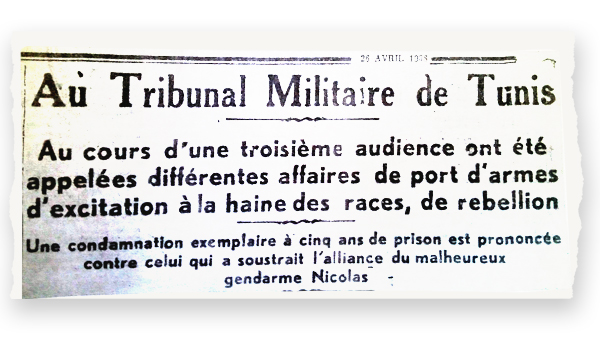
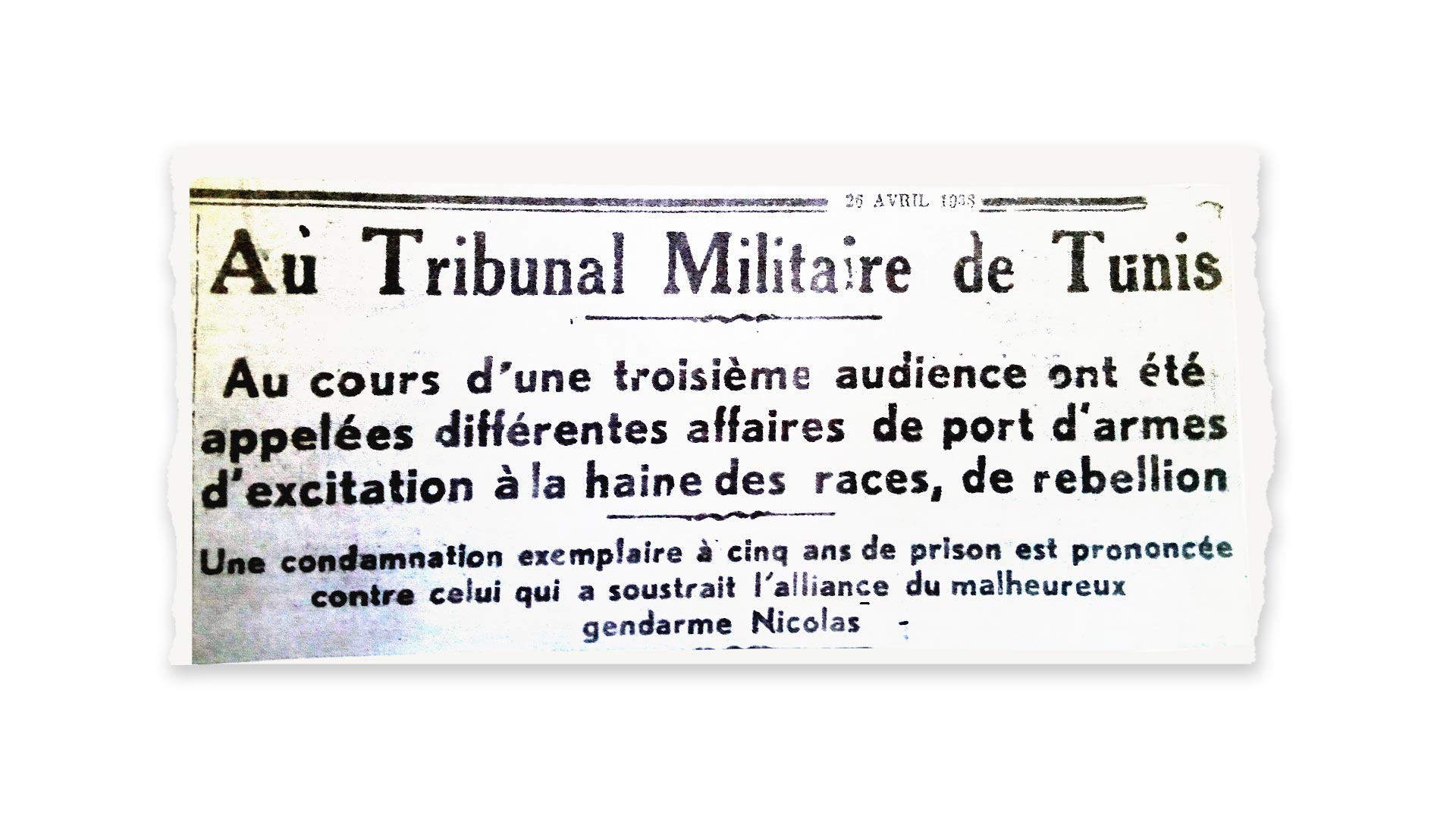
National Documentation Centre
The colonial newspapers liked to express vengeful sentiments regarding the Neo-Destour party, and argued that the members of the party did not deserve the "generosity and liberalism" of the ruling leftists, which they saw as "synonymous [...] with weakness". For when it comes to them, "freedom easily degenerates into getting licenced, licenced to revolt" ( La Dépêche tunisienne, April 12).
In essence, they are not suited to freedom and only deserve repression. What is worse is that they would be unsuited to the sensitivity of Western philosophy: "authority [...] risks being disarmed by this contribution of Western formulas, acquired after centuries of evolution [...] to an Eastern environment that is ill-prepared to receive them, inclined to abuse them, and open to all their harmful consequences." (La Tunisie française, April 10).
The main activists of the party were thus particularly lynched, and it was necessary to "get rid of these troublemakers by deporting them to a distant colony". Considered to be cowards*, the press accused them of manipulating and "intoxicating" the masses who were said to be devoid of political understanding: "hiding behind their inkpots, they will continue to send poor and ignorant people to their deaths [...] while they remain quietly at home, warming their shins. It is better to take away the freedom of the troublemakers than to find oneself in the regretful necessity of eliminating those unfortunates who have been driven by them to the worst extremes." (La Dépêche tunisienne, April 12).
The version relayed by the media was accompanied in practice by a vast arrest campaign facilitated by a decree that extended the state of siege to the regions of Grombalia and Sousse.
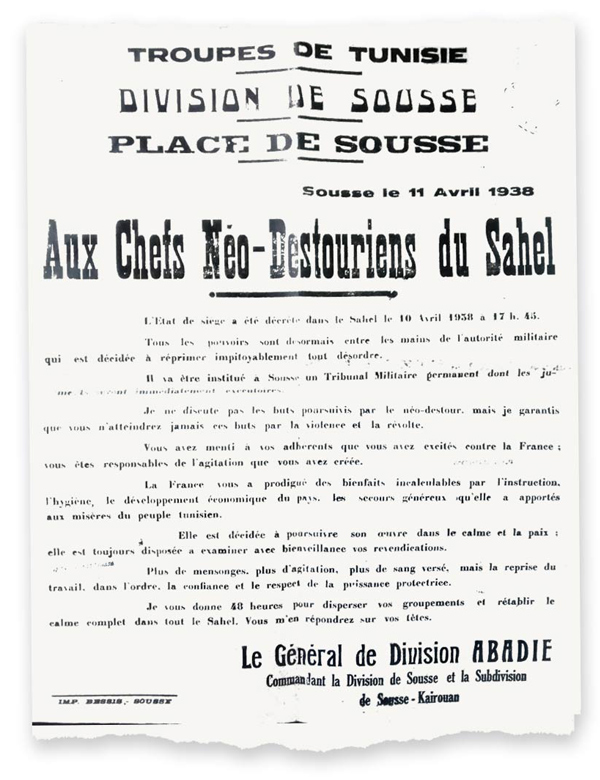
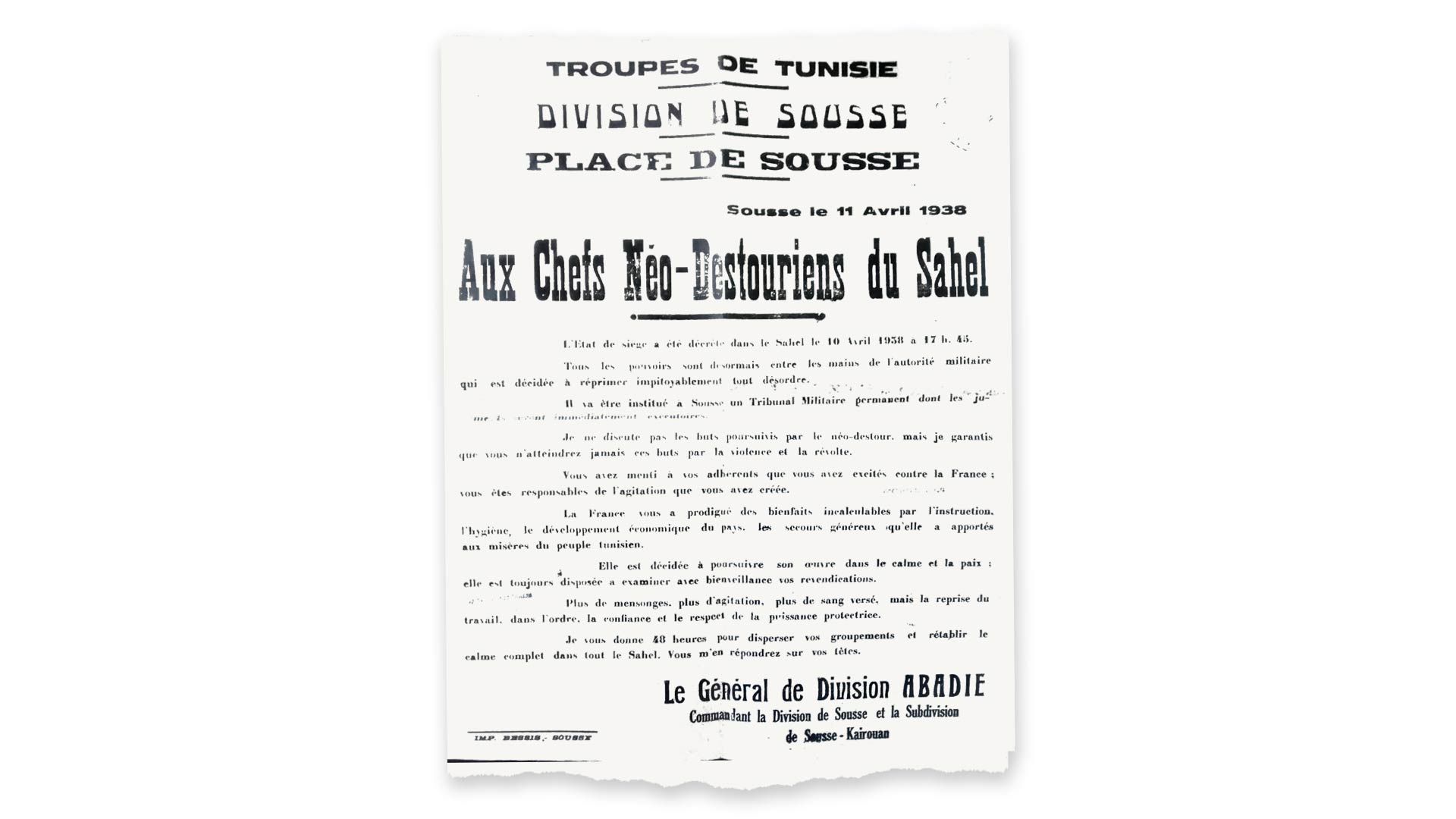
Tunisian National Archives
Arrests in Response to Grievances
The military authorities now had the right to carry out both day and night searches in the homes of suspects, and several arrests were carried out: 272 in Tunis and 659 in total throughout the country between April 9 and the days that followed. The police also continued to carry out raids, particularly in the neighbourhoods bordering the Medina, especially in Mellassine where they made several arrests. Thus, this day, which was the continuation of a movement fighting for the liberation of detainees, resulted in an even longer list of prisoners
Some Italians were also arrested during the arrest campaign, but the justice system was very lenient towards them, unlike with the Tunisians. A detainee named Ahmed ben Azizi is sentenced to one year in prison and fined with 500 francs for carrying a knife; Hassen ben Amar is sentenced to six months in prison for "rebellion against agents of the public authorities"; Larbi ben Hamadi is sentenced to one year in prison and 500 francs in fines for possession of a razor and a cobbler's knife; a "ftaïeri from Matmata who appeared harmless hid a razor in the bonnet of his 'burnous'". But "despite his respectable appearance, the court sentenced him to a year in prison and a fine of 1000 francs".
On the other hand, Giovanni Giglio, who was armed with a revolver, benefited from extenuating circumstances (he wanted "to protect his supply of artichokes that he was bringing to the central market") and was sentenced to 8 days of imprisonment and a fine of 100 francs; Aldo Calogero who had an "automatic pistol in his car satchel", was only sentenced to 1 day in prison; Joseph Santini, who punched an officer, (which the Tunisian detainees who had been sentenced before him had not done), was sentenced to 3 months in prison*.
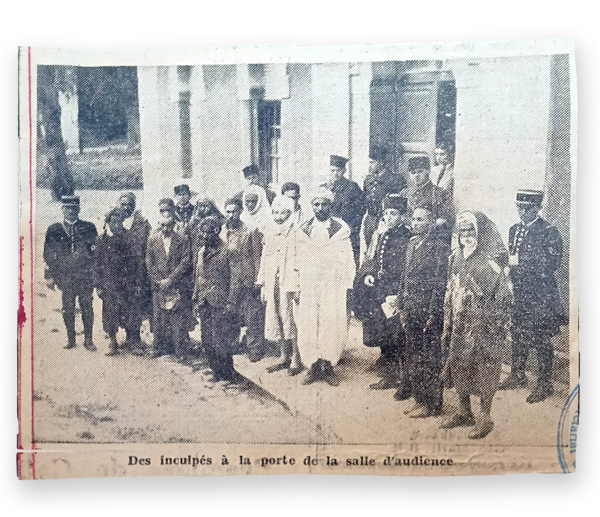
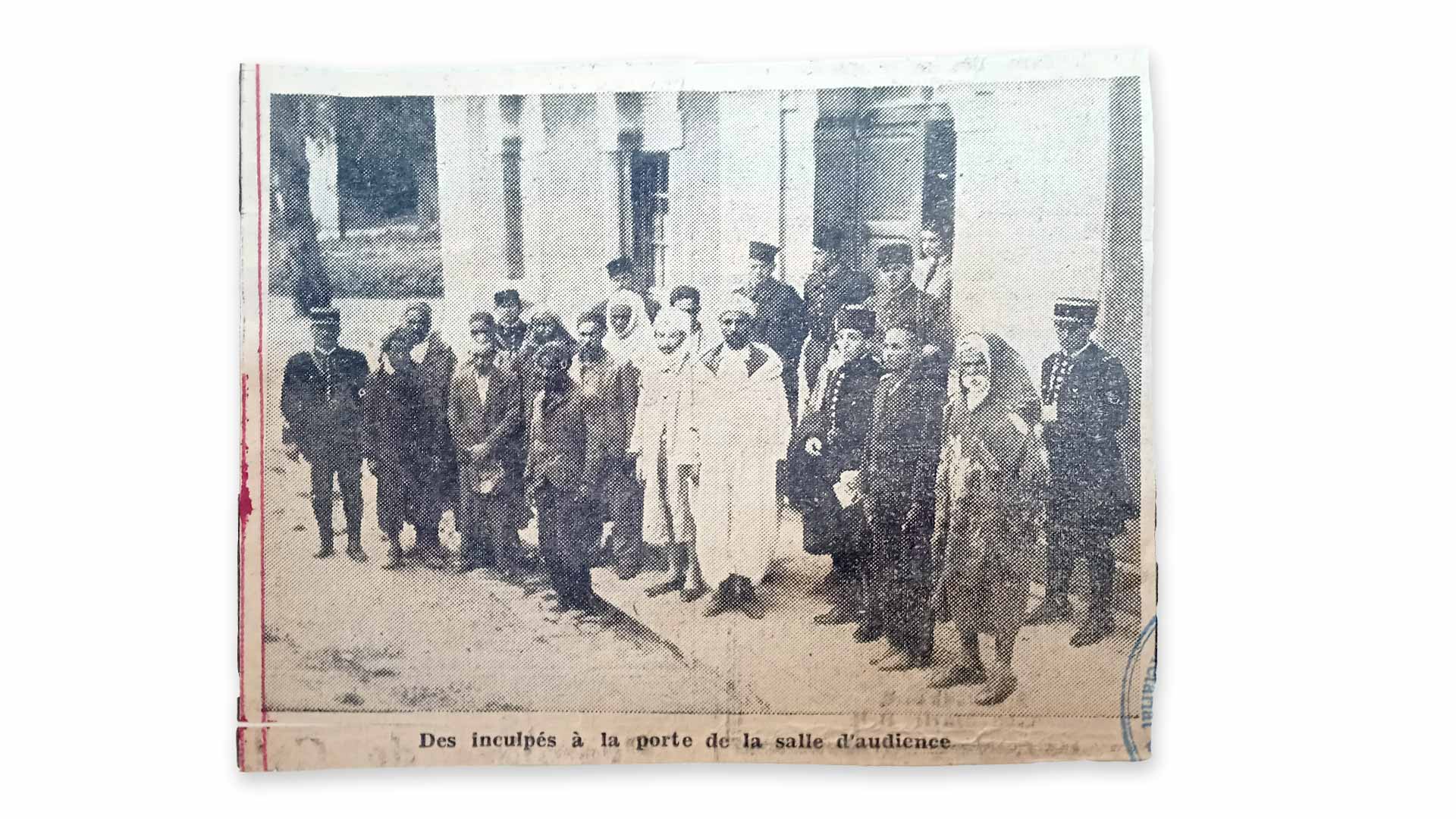
National Documentation Centre
The after effects of April 9 were not easily forgotten among the population. Students from 'Zeytun' embarked on a series of protests and strikes, and various associations continued their activism. This bloody day also reinforced the politicisation of women, which had become an increasingly visible topic since the mid-1920s. Thus, on November 22, 1938, following the arrival of the new resident general 'Labonne', a group of female activists welcomed him with a bouquet of flowers at the port of Tunis. As he willingly accepted the bouquet, they started chanting: "Long live the Destour!" They were immediately arrested.
The media did not hesitate to ridicule their efforts to disrupt the amnesty that was imposed after the events of April 9: "This is a lack of political maturity that we deplore [...]. Why did these young women find themselves leading a demonstration, thus giving a mostly childish gesture, a defiant character? [...] Don't they have older and more thoughtful advisers?" (La Presse de Tunisie, December 28, 1938).
The Neo-Destour party was dissolved, its cells were banned throughout the country, as was its official organ 'L'Action'. Thirteen militants, including Habib Bourguiba, were arrested on April 10 and tried by a military court. The charges were: "rebellion", "incitement to racial hatred", "carrying prohibited weapons", and "insulting the French army".
From Protests to Power
The repression suffered by the Néo-Destourians contributed to a form of mythification of the party, which was now in power since the day after independence. Along this mythification it is easy to forget that not all the victims of the bullets and the wounded were necessarily loyal to the party.
However, it was the sacrifices made by the Neo-Destour that were celebrated at the time of independence and from which the young nation state drew its national narrative. The 9th of April 1938 is integrated into the long epic of the history of the national movement, which for a long time was centred on the biography of President Bourguiba alone. Although he was absent from the April mobilisations, he praised the victims of that afternoon's confrontations, as they, according to him, through sacrificing themselves for the country, were above all sacrificing themselves for his party.
Initially perceived as a dangerous episode by the colonial powers, April 9 was later considered to be a moment of national cohesion. By taking the opposite view of the colonial discourse, which insisted on marginalising the Neo-Destour on the political scene and dividing the population, the national narrative placed the party at the centre by making it a symbol of popular unity.
We thus move - from a day that was construed by the colonial power through the lens of social divides, underlining the divisions between Jewish and Muslim populations; Communists and Destourians; Old-Destour and Neo-Destour; the bourgeoisie and the working classes; the rural and the urban areas; etc., - to a day that was considered by the national power as the people uniting to express a shared objective: independence and self-sacrifice.
This thundering narrative left little room for the plurality of struggles (feminist- [led by women], Zeytunian-, labourer-, trade union-, communist-, popular- movements, etc.) and the aura of the single party reigned for decades before the official narrative began to crumble and was replaced by others.





